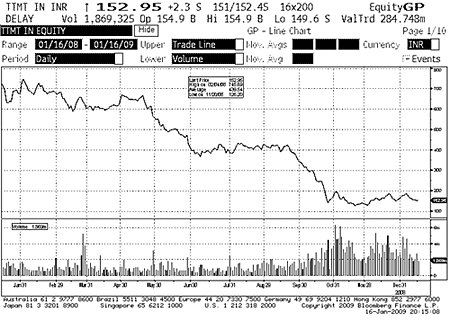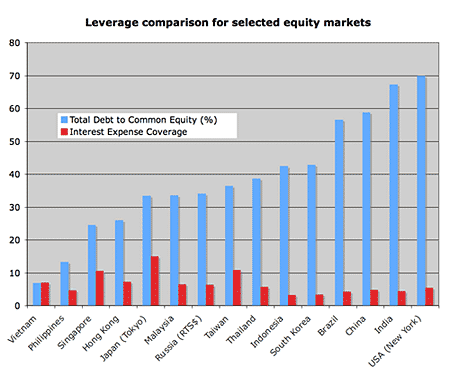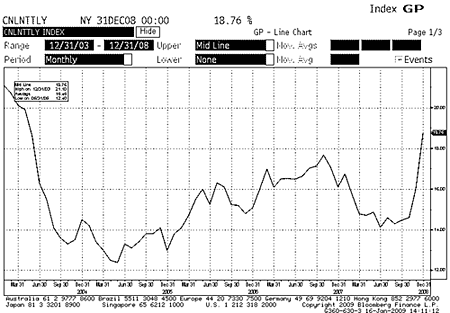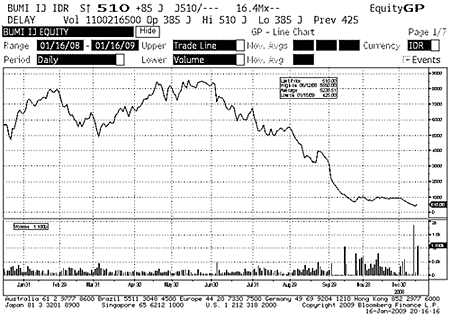Why Asia looks less vulnerable than the rest of the world
The next few months will be miserable for everyone. But compared to the West, Asia's corporate debt position looks fairly sound. India and South Korea may struggle, but overall, says Cris Sholto Heaton, Asia could be well-placed to thrive.

Get the latest financial news, insights and expert analysis from our award-winning MoneyWeek team, to help you understand what really matters when it comes to your finances.
You are now subscribed
Your newsletter sign-up was successful
Want to add more newsletters?

Twice daily
MoneyWeek
Get the latest financial news, insights and expert analysis from our award-winning MoneyWeek team, to help you understand what really matters when it comes to your finances.

Four times a week
Look After My Bills
Sign up to our free money-saving newsletter, filled with the latest news and expert advice to help you find the best tips and deals for managing your bills. Start saving today!
"Neither a borrower nor a lender be," says Polonius in Hamlet. It's fortunate for his sanity that he wasn't part of today's world. For the last couple of decades, the desire to borrow, borrow, borrow has been insatiable for both businesses and consumers. Or at least it was until the credit markets buckled last year.
But Polonius might be coming into his own again. We're likely to face a world obsessed with deleveraging instead of gearing up for some time. That has big implications for companies and investors. The good news is that Asia is less leveraged than much of the world -but it certainly isn't immune
Why Tata should never have bought Jaguar
A few weeks ago, car-maker Jaguar Land Rover (JLR) picked up a trick from its US peers and went cap in hand to the British government. It was rebuffed (although perhaps not for long) and instead its parent, India's Tata Motors, agreed to inject more cash into the struggling firm.
MoneyWeek
Subscribe to MoneyWeek today and get your first six magazine issues absolutely FREE

Sign up to Money Morning
Don't miss the latest investment and personal finances news, market analysis, plus money-saving tips with our free twice-daily newsletter
Don't miss the latest investment and personal finances news, market analysis, plus money-saving tips with our free twice-daily newsletter
I suspect quite a few people were baffled by this story. After all, wasn't the sale of JLR by cash-strapped Ford to Tata supposed to secure its future? Why is its rescuer now lobbying the UK government for a reported £1bn?
I'm less surprised. I can't say I expected it to unravel this quickly, but I could never understand why Tata was paying a cent for JLR, let alone $2.3bn. All along, it looked like an expensive mistake.
Groups like JLR tend to be cash-swallowing black holes rather than cash cows. The main attraction was how Tata could use the brand to raise its image, yet if a brand like Jaguar becomes too closely associated with a mass-market car and commercial vehicle firm such as Tata, it devalues the very thing you've just paid over the odds for.
And today, JLR looks like the worst possible deal at the worst possible price at the worst possible time. Tata structured the deal in a way typical of the buyout boom's excesses: it took out a $3bn bridge loan to fund the purchase and provide working capital, intending to pay part of it back through a rights issue, sales of stakes in other subsidiaries and raising some longer-term debt.
Unfortunately, in today's climate, refinancing that short-term loan is looking more difficult. Tata's plans for a $600m international rights issue seem to be on hold and an $840m domestic one in October was undersubscribed. Instead, the firm is now trying to raise money through small investors and savers, offering 11% interest on three-year fixed term deposits which scarcely speaks well of its other options for raising money.
Tata shares have further to fall
Tata has other problems. The launch of its much-touted ultra-low cost car, the Nano (priced at one lakh about $2,000) has been delayed, while sales at its core commercial vehicles business are plummeting (down 51% year-on-year in December).
So it's no surprise that S&P recently downgraded its debt to BB- or speculative. Asset sales or a bailout by other parts of the sprawling Tata comglomerate look quite likely in the months ahead. The already-ugly share price chart below could get a lot worse.

Which country's companies carry the most debt?
Tata is by no means alone. There are plenty of companies out there that are over-leveraged thanks to peak-cycle acquisitions and investments - and any that need to refinance will find it a lot tougher than it was three years ago. I think India could be one of the worst hit parts of Asia in this respect.
Take a look at the chart below, which shows the median total-debt-to-equity ratio and interest cover for the Asian markets, plus a few other international ones for comparison. A higher debt-to-equity ratio indicates a higher debt burden, while higher interest coverage - the number of times that interest payments are covered by earnings - indicates a lower debt burden.

It's important to be cautious when drawing conclusions from this, because it only refers to listed firms and so may not give a complete picture of the whole corporate sector. But bearing that in mind, the results are pretty much what you'd expect. US firms are clearly the most heavily leveraged, thanks to the fad for gearing up to 'enhance shareholder returns'.
However, India is not far behind, which fits with the impression I get from analysing individual companies. Broader economic statistics also point to overheated credit growth there: outstanding lending from banks tripled between 2003 and 2007, compared with a doubling of GDP. A corporate sector that's grown by gearing up over the last few years is going to find things much tougher in this environment, especially given that a good amount of the funding came from overseas because of India's relatively-underdeveloped bond market.
China's leverage is also relatively high, but I'm not as concerned about this, since the trend there has been deleveraging rather than gearing up over the last few years. With the government now pushing banks to lend more, Chinese firms - which largely depend on domestic sources for borrowing - are likely to find it easier rather than harder to access finance.
I mentioned in the last issue that Chinese loan growth is an indicator to keep your eye on this year. The latest figures (below) show lending picked up again in December. While these are very early days and it's impossible to know if this money is being channelled productively, this is an encouraging sign for Chinese investment and the domestic economy.

Among the other markets, Indonesia and South Korea are probably at some risk as well. That's not because leverage is exceptionally high relative to the region, but because conditions in the banking systems are still tight and many firms in both countries have substantial foreign currency borrowings.
At the other end of the spectrum, Hong Kong and Singapore-listed firms look fairly lowly-geared overall. Hong Kong-listed Chinese firms - which are the China stocks that most funds and individual investors own - seem to be considerably less geared than the China average, with the 50 largest stocks having a median debt to equity ratio of 44.40% and interest cover of 11.90 times.
Overall, Asia's corporate debt position looks fairly sound, especially compared with the overburdened firms of the West. There's probably a substantial shakeout to come in India and South Korea, but taken with an even healthier consumer debt position in most countries, Asia looks well-placed to thrive in this new, deleveraging world once, that is, we get through what is bound to be a miserable few months.
Who controls those shares?
But from a shareholder's point of view, it's not just debt directly owed by companies that can cause trouble. In some markets, it's been pretty common for owner-founders to use their holdings as collateral against loans: in fact, common to the extent that it "has clearly been aggressively encouraged by private bankers in recent years when they were not flogging 'guaranteed' structured finance products", as Christopher Wood of CLSA puts it in the latest issue of Greed & Fear.
The carnage among Russia's oligarchs was the most widespread example, but there have been plenty of other examples, including the Satyam scandal in India, where the plummeting value of the founder's shares pledged as collateral for loans seem to have played a major part in exposing the fraud. And lest anyone think this is an emerging market problem, a flick back through the financial pages will reveal some remarkably similar tales in the USA and Britain.
In fact, adds Wood dryly, "this is one area where China's quoted SOEs [state-owned enterprises] should prove much less risky for fund managers for the simple reason that senior executives who engage in heavy borrowing against their own share prices risk being shot." Perhaps the FSA and SEC could take note.
Strange goings-on at Bumi
One case that's still rumbling on is the fate of Indonesia's Bakrie & Brothers in November. Bakrie, which is controlled by the family of welfare minister Aburizal Bakrie, is one of those sprawling conglomerates that are almost extinct in the West but still popular in Asia. Its investments span natural resources, telecoms, property and more, including a major shareholding in coal giant Bumi Resources.
As markets fell late last year, Bakrie-owned stocks pledged against $1.2bn in loans no longer provided enough collateral. Once this became common knowledge, investors dumped shares in anything Bakrie-controlled for fear that the conglomerate would have to sell its holdings at knockdown prices to repay the loans. This rout contributed to Indonesia's stockmarket being closed for several days at the peak of the crisis.
At the time, Bakrie seemed on the verge of collapse. Today, though, it seems to have survived but it's not completely clear how. It's known that it managed to arrange deals with hedge funds and private equity groups to take over some of its debt in exchange for equity stakes in some of its companies. But details have been scarce.
Indeed, the latest move looks rather worrying for Bumi shareholders. The firm announced a rights issue a few weeks ago, then revealed it plans to buy three smaller coal miners for $565m. But analysts suggest the deals will destroy value for Bumi shareholders in one case, it appears to be paying $2.6 a tonne of reserves compared with the valuation of $0.93 a tonne that it puts on reserves it already owns. Others question who the ultimate owners of the companies are and whether these deals could be channeling money into other cash-strapped parts of the Bakrie empire.
Bapepam, the Indonesian market regulator, is investigating the deals, while foreign investors who have long used Bumi both as a resources play and a proxy for Indonesia in portfolios are reportedly shunning the firm. Shares have been hammered: after falling 90% since the summer, they have been halved again since rumours about this deal began circulating at the start of the year.

The warning from this apart from the importance of corporate governance, which much of Asia is still not hot on is that it's not just leverage that counts, but links to anything with high leverage. Unfortunately, in a market like Indonesia's, that can be pretty hard to determine.
Turning to the markets...
table.ben-table table { border: 3px solid #2b1083;font: 0.928em/1.23em verdana, arial, sans-serif;}
th { background: #2b1083; padding: 10px 5px;color: white;font-weight: bold;text-align: center;border-left: 1px solid #a6a6c9;}th.first { border-left: 0; padding: 5px 2px;text-align: left;}
tr {background: #fff;}
tr.alt {background: #f6f5f9; }
td { padding: 5px 2px;text-align: center;border-left: 1px solid #a6a6c9;color: #000;vertical-align: center;}td.alt { background-color: #f6f5f9; }
td.bold { font-weight: bold; }td.first { border-left: 0; text-align: left;}
| China (CSI 300) | 1,990 | +3.8% |
| Hong Kong (Hang Seng) | 13,256 | -7.8% |
| India (Sensex) | 9,324 | -0.9% |
| Indonesia (JCI) | 1,364 | -3.8% |
| Japan (Topix) | 818 | -4.3% |
| Malaysia (KLCI) | 896 | -2.5% |
| Philippines (PSEi) | 1,950 | -1.8% |
| Singapore (Straits Times) | 1,730 | -4.2% |
| South Korea (KOSPI) | 1,135 | -3.9% |
| Taiwan (Taiex) | 4,354 | -3.3% |
| Thailand (SET) | 435 | -5.2% |
| Vietnam (VN Index) | 306 | -2.2% |
| MSCI Asia | 78 | -8.6% |
| MSCI Asia ex-Japan | 272 | -4.9% |
Equity markets across Asia sold off with the rest of the world last week, with Hong Kong especially hard hit. Among other fallers, HSBC was down 14% after a Morgan Stanley analyst suggested that it would need to raise as much as $30bn in new capital.
Economic data was poor across the region, with Singapore reporting a 20.8% year-on-year drop in non-oil domestic exports. Japanese machinery orders dropped 16.2 month-on-month, the biggest since the survey began in 1987. In Thailand, the central bank cut its base rate by a larger-than-expected 75 basis points (one basis point equals 1/100th of a percentage point). China's exports fell for a second consecutive month, down 2.8%, while imports were down 21.3%.
In the hard-hit steel industry, China's Baosteel cancelled a planned plant in Brazil with local mining giant Vale, citing falling demand. Separately, several Chinese steelmakers reported sharp drops in profit on weak sales and falling prices late last year. Prices within China have rebounded 43% from their November lows after the government announced its RMB4trn, infrastructure-heavy stimulus package, but remain 30% down from their highs.
There were limited sign of improvement in Asian credit markets. Over $30bn in bonds has been issued since the start of the year, almost three times as much as this time in 2008, as markets begin to unfreeze. Export-Import Bank of Korea (Kexim) and Korea Development Bank (KDB) both issued $2bn in dollar-denominated bonds yielding around 675 basis points more than US Treasuries, towards the lower end of what they were expected to have to offer. However, spreads remain very high by past standards; a year ago, KDB issued bonds at just 218 basis points more than Treasuries.
Get the latest financial news, insights and expert analysis from our award-winning MoneyWeek team, to help you understand what really matters when it comes to your finances.

Cris Sholt Heaton is the contributing editor for MoneyWeek.
He is an investment analyst and writer who has been contributing to MoneyWeek since 2006 and was managing editor of the magazine between 2016 and 2018. He is experienced in covering international investing, believing many investors still focus too much on their home markets and that it pays to take advantage of all the opportunities the world offers.
He often writes about Asian equities, international income and global asset allocation.
-
 RICS: UK housing market showing signs of 'tentative recovery'
RICS: UK housing market showing signs of 'tentative recovery'RICS members are becoming less negative about property sales and house prices. What does the latest data mean for the property market?
-
 Last chance to invest in VCTs? Here's what you need to know
Last chance to invest in VCTs? Here's what you need to knowInvestors have pumped millions more into Venture Capital Trusts (VCTS) so far this tax year, but time is running out to take advantage of tax perks from them.